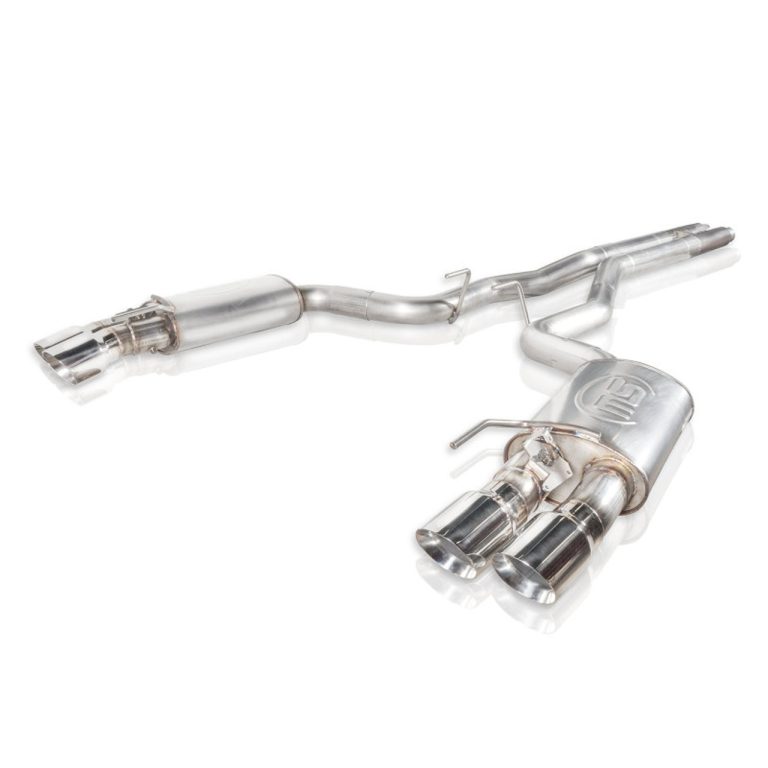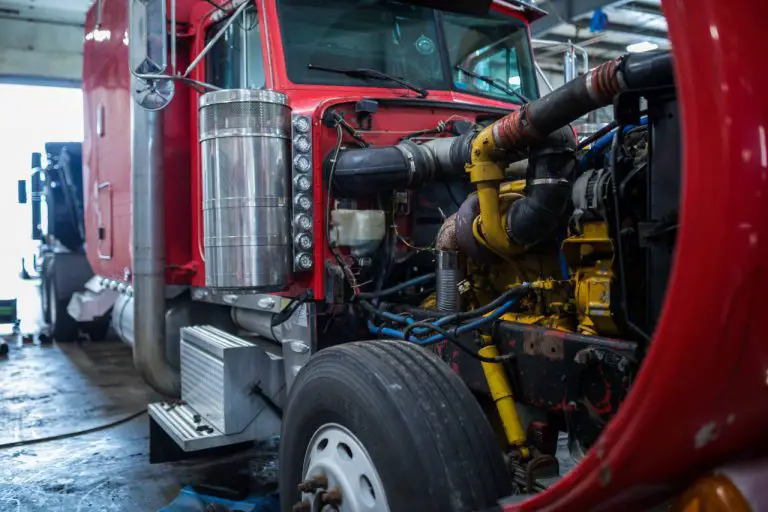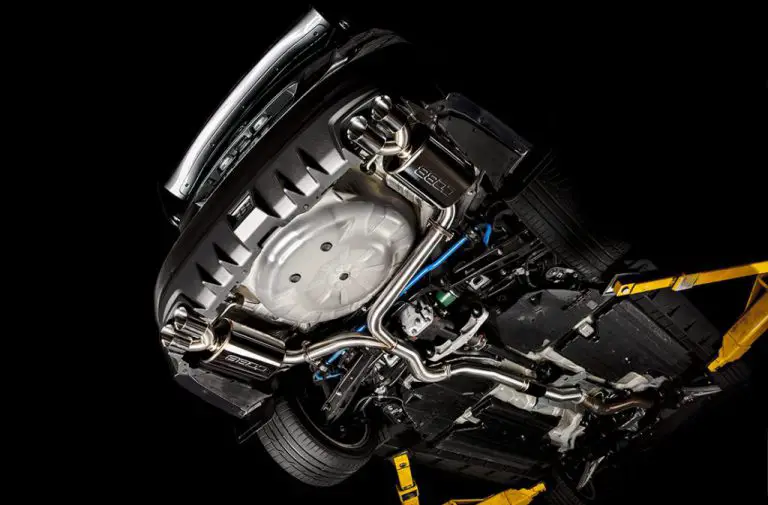How Exhaust Systems Supercharge Engine Performance: Unlocking the Science Behind It
Exhaust systems improve engine performance by expelling harmful gases, reducing backpressure, and improving airflow efficiency, resulting in increased power and fuel economy. The science behind it lies in the design of the exhaust system, which includes components such as the exhaust manifold, catalytic converter, muffler, and tailpipe.
As the exhaust gases flow through these components, they are channeled and directed to optimize their expulsion while minimizing resistance. This allows the engine to breathe more easily, leading to improved combustion and enhanced overall performance. By effectively managing exhaust gas flow, the exhaust system plays a crucial role in optimizing engine horsepower, torque, and efficiency.
Understanding the science behind exhaust system design can help car enthusiasts and mechanics make informed decisions when it comes to upgrading or replacing these components.

Credit: store.schnitzracing.com
Subheading 1: Understanding The Role Of Exhaust Systems
Exhaust systems play a crucial role in improving engine performance by supporting the combustion process. By expelling the harmful gases produced during the combustion process, the exhaust system maintains the engine’s efficiency. This process ensures that the engine can breathe properly, allowing for a more effective and clean combustion cycle.
The importance of exhaust systems in engine performance cannot be understated, as they help to minimize back pressure and increase power output. Additionally, they contribute to reducing engine noise by muffling the sound generated during the combustion process. From catalytic converters to mufflers, each component of the exhaust system plays a vital role in achieving optimal engine performance.
By understanding the function and significance of exhaust systems, you can maximize the efficiency and lifespan of your vehicle’s engine.
Subheading 2: The Components Of An Exhaust System
Exhaust systems play a crucial role in enhancing engine performance by efficiently expelling waste gases. The key components of an exhaust system consist of the manifold, catalytic converter, muffler, and tailpipe. The manifold collects the gases from the engine’s cylinders and channels them towards the exhaust system.
The catalytic converter helps to convert harmful pollutants into less harmful substances. The muffler reduces the noise produced by the engine’s exhaust gases, while the tailpipe serves as the final outlet for the gases. Each component works in harmony to optimize engine performance, improve fuel efficiency, and reduce harmful emissions.
By understanding the science behind exhaust systems and their components, one can appreciate how these systems contribute to a smoother and more efficient running vehicle.
Subheading 3: Optimizing Exhaust System Design For Performance
Optimizing the design of an exhaust system is crucial in enhancing engine performance. Various factors must be considered when selecting an exhaust system that can effectively improve engine functionality. The impact of exhaust system design on engine performance cannot be overlooked.
By carefully analyzing aspects such as the diameter and length of the exhaust pipes, as well as the type and position of the muffler, engineers can significantly enhance engine performance. Furthermore, the optimal design can promote better airflow, reducing backpressure and allowing the engine to expel exhaust gases more efficiently.
This not only improves horsepower and torque but also enhances fuel economy. Additionally, the design of the exhaust system can also influence the sound produced by the vehicle, offering a desired tone while minimizing noise pollution. Taking these factors into consideration helps ensure that the exhaust system is tailored to enhance engine performance effectively.
Subheading 1: The Flow Dynamics Of Exhaust Gases
Exhaust systems play a crucial role in enhancing engine performance. By understanding the flow dynamics of exhaust gases, we can delve into the science behind it. The behavior and characteristics of these gases are critical to understanding how an exhaust system operates.
One of the key factors to consider is backpressure, which has a significant impact on engine performance. It occurs when the exhaust gases face resistance in their exit path, causing them to slow down. This can be detrimental to the engine’s efficiency and power output.
Optimized exhaust systems are designed to minimize backpressure, allowing for smooth and efficient flow of the gases. By doing so, they help improve engine performance, delivering more power and better fuel efficiency. Understanding these underlying principles is paramount to maximizing the potential of an engine and ensuring its optimal performance.
Subheading 2: The Role Of Exhaust Scavenging
Exhaust systems play a crucial role in enhancing engine performance by utilizing the concept of exhaust scavenging. Exhaust scavenging refers to the process of expelling exhaust gases from the engine cylinders. This is achieved by strategically designed exhaust headers and pipes.
The concept of scavenging aims to create a pressure difference between the exhaust and intake valves, which ultimately boosts engine power. Efficient exhaust scavenging ensures a more complete evacuation of exhaust gases, allowing fresh air-fuel mixture to enter the cylinders during the next stroke.
As a result, the engine can generate more power with each combustion cycle. By maximizing the power output, efficient exhaust scavenging significantly improves engine performance, providing better acceleration, increased torque, and enhanced overall efficiency. This not only benefits the vehicle’s performance but also contributes to reduced emissions and better fuel economy.
Subheading 3: The Efficiency Of Exhaust Gas Expulsion
Exhaust systems play a crucial role in enhancing engine performance by efficiently expelling exhaust gases. Different methods are employed to optimize this process. By using headers, the exhaust gases are directed away from the engine, reducing backpressure and improving efficiency.
The incorporation of catalytic converters aids in converting harmful pollutants into less harmful substances. Furthermore, the inclusion of resonators and mufflers helps minimize excessive noise produced during the expulsion of exhaust gases. Selecting the appropriate diameter and length for the exhaust pipes also contributes to optimizing gas flow.
By utilizing these various techniques, exhaust systems ensure the efficient expulsion of exhaust gases, resulting in improved engine performance.
Subheading 1: Aftermarket Exhaust Systems And Performance
Exhaust systems play a crucial role in enhancing the performance of an engine. Aftermarket exhaust systems, specifically, are known for their ability to deliver improved results. By optimizing airflow, these modified exhaust systems allow for more efficient and unrestricted exhaust gas expulsion.
This, in turn, increases engine power and torque. Additionally, aftermarket exhaust systems are designed to reduce back pressure, resulting in enhanced fuel economy. These systems are often crafted using high-quality materials like stainless steel, which not only improves durability but also reduces weight.
Another benefit of aftermarket exhaust systems is the ability to customize the sound output of the engine, providing a sporty and aggressive tone. Overall, these modifications contribute to a better driving experience with increased performance and an appealing soundtrack. So, if you’re looking to unlock your engine’s true potential, aftermarket exhaust systems are definitely worth considering.
Subheading 2: Exhaust System Upgrades For Power Boost
Exhaust systems play a crucial role in improving engine performance by optimizing airflow. When it comes to power boosts, exhaust system upgrades offer a range of benefits. Understanding the various modifications available is key. From high-flow catalytic converters to performance mufflers, each upgrade contributes to power improvement.
These modifications enhance exhaust gas flow, reducing backpressure and allowing the engine to expel spent gases more efficiently. Upgrading the exhaust system also leads to a deeper, more aggressive sound, which is a desirable feature for many car enthusiasts. With specific modifications tailored to a vehicle’s needs, power gains can be achieved without sacrificing fuel efficiency.
By investing in exhaust system upgrades, drivers can optimize their engine’s power output and enhance overall driving experience.
Frequently Asked Questions For How Exhaust Systems Improve Engine Performance: Exploring The Science Behind It
How Do Exhaust Systems Improve Engine Performance?
Exhaust systems improve engine performance by increasing horsepower, reducing backpressure, and improving fuel efficiency. They achieve this by efficiently removing exhaust gases from the engine, allowing fresh air to enter the combustion chamber, and enhancing the scavenging effect.
What Is The Science Behind Exhaust Systems?
The science behind exhaust systems involves a combination of fluid dynamics, thermodynamics, and combustion principles. The design and engineering of the system aim to optimize the flow of exhaust gases, control backpressure, and minimize turbulence, resulting in improved engine performance and reduced emissions.
Do Aftermarket Exhaust Systems Really Make A Difference?
Yes, aftermarket exhaust systems can significantly impact engine performance. High-quality systems with larger diameter pipes, free-flowing mufflers, and efficient catalytic converters can increase horsepower, enhance sound, and improve fuel efficiency. However, it’s crucial to choose the right system for your specific vehicle and engine to ensure optimal results.
What Are The Benefits Of Upgrading Exhaust Systems?
Upgrading exhaust systems offers several benefits, such as increased horsepower and torque, improved fuel economy, enhanced engine sound, reduced backpressure, and decreased emissions. It can also add a visually appealing aspect to the vehicle’s appearance while providing better overall performance and driving experience.
Can An Exhaust System Affect Fuel Efficiency?
Yes, an exhaust system can impact fuel efficiency. Upgrading to a high-performance system can improve fuel economy by reducing backpressure and optimizing exhaust flow, allowing the engine to operate more efficiently. However, it’s essential to consider other factors like driving habits and engine condition to achieve optimal fuel efficiency.
Conclusion
Exhaust systems play a crucial role in enhancing engine performance. By expelling harmful gases and reducing backpressure, these systems effectively increase power output and fuel efficiency. The science behind exhaust systems revolves around optimizing airflow and creating a balanced environment within the engine.
With the help of carefully designed components like headers, catalytic converters, and mufflers, exhaust systems ensure that the engine operates at its full potential, delivering superior performance and reducing emissions. The intricate design and engineering of exhaust systems are a testament to the continuous evolution of automotive technology.
From improving horsepower and torque to enhancing the overall driving experience, exhaust systems have a significant impact on the performance and efficiency of modern-day engines. So, whether you’re a car enthusiast or simply interested in the science behind it, exploring the world of exhaust systems is sure to leave you in awe of the intricate mechanisms that make engines purr.






